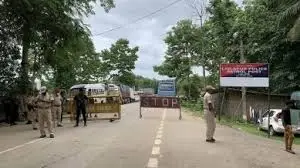Scores picked up across Assam, police call it document verification drive

Recently, Assam police stepped up efforts to verify citizenship status. The “document verification drive” led to the detention of many people in districts like Guwahati, Golaghat, Dhubri, Barpeta, and Cachar. Officials call this a routine process to confirm lawful residency. However, the operation’s scale and speed caused concern and sparked debates.
Background and Government Directive
The Union Ministry of Home Affairs issued the directive for this drive. It required states to review the status of people suspected of illegal immigration from Bangladesh and Myanmar. Assam began this verification with a 30-day deadline.
This move aligns with national priorities about border security and citizenship. Assam shares borders with Bangladesh and is near Myanmar. This location makes it vulnerable to immigration challenges. Assam has faced demographic and political tensions linked to immigration for years.
The Operation on the Ground
Over the weekend, police conducted raids and document checks in several districts. They detained around 150 individuals. Police called them “doubtful citizens.” The detainees were taken to Rupnagar Police Reserve in Guwahati. Authorities are verifying their IDs, voter cards, and other proofs.
Officials stressed that the drive is routine and not targeting any group. They said it helps keep accurate records and detect undocumented migrants. However, they did not explain how they selected people for detention.
The police have not shared the criteria used to identify “doubtful” individuals. This lack of transparency worries civil society and human rights groups.
Community Reactions and Concerns
The drive has unsettled many communities, especially Bengali-origin Muslims. Many fear harassment or wrongful detention. Families of detainees protested outside police stations. They demand their relatives’ release and recognition as Indian citizens.
The All Assam Minority Students’ Union (AAMSU) criticized the drive. They said the government should use legal methods, like Foreigners’ Tribunals, instead of mass detentions. These tribunals handle citizenship disputes fairly, they argue.
Human rights activists warn about possible abuses during verification. They fear detentions without due process could violate civil rights. Activists call for transparency and rule of law in these operations.
Political and Social Implications
Assam’s socio-political background makes this drive sensitive. Immigration and citizenship remain hot topics in the state. The Assam Accord of 1985 set 1971 as the cutoff for including immigrants in electoral rolls. But citizenship verification remains complex.
Recent developments, like the National Register of Citizens (NRC) and Citizenship Amendment Act (CAA), add to tensions. The NRC excluded around 1.9 million people deemed ineligible. This sparked protests and legal battles.
The CAA fast-tracks citizenship for non-Muslim migrants but faces opposition in Assam. Many see it as unfair and disruptive to the local demographic balance.
This verification drive is not just a police action. It touches on deep-rooted fears and political debates. Political parties and groups are closely monitoring the situation.
Legal and Humanitarian Perspectives
Legal experts question detainees’ rights and the process followed. Indian law guarantees fair hearings before deprivation of liberty. Mass detentions without legal counsel or clear charges might violate this.
Humanitarian groups stress protecting vulnerable groups. Poor or displaced people often lack proper documentation. This makes proving citizenship harder for them.
The government must balance national security with individual rights. Transparent and humane verification is vital for public trust.
What Lies Ahead?
Authorities face pressure to clarify the operation’s scope and methods. Communities want clear communication to reduce fear and tension.
The outcome will affect Assam’s social and political future. Success with legal safeguards could serve as a model. Mistakes or abuses could deepen divides and invite legal challenges.
For now, families wait for news about detainees. Communities remain anxious. Officials prepare for the next steps. This drive highlights the complex links between identity, legality, and human dignity in Assam.






